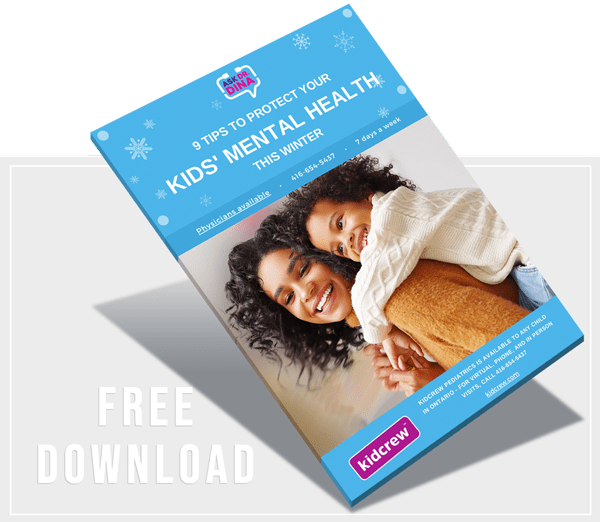From the time they arrive, we cannot help but compare our children – how much does he weigh? How much does she sleep? How well does he eat? Is she saying much yet?
If your child’s behaviour starts to seem different from their peers, you may begin to imagine there may be “something wrong with my child.” While kids develop at different rates, a clinical assessment from a health professional and possibly some early intervention can be especially helpful.
As your child gets older, the question of a mental health diagnosis may surface either from parents seeking out information or from a teacher or care provider at school or daycare. Sometimes a child who has been progressing well suddenly becomes very angry, sad, or worried.
Are there pros and cons of having your child assessed for a mental health diagnosis?
Yes – Mental health diagnoses vary from many physical health diagnoses in that there is no specific of definitive test (such as a blood test, or imaging) to detect whether a child, or adult, is suffering from has a mental health disorder. Mental health diagnoses are made of several components, some based on clinical interviews, assessment or rating scales, observations, and sometimes tasks and tests we ask the child is asked to complete.
Depending on the country you live in, and yor health care provider, you may be more or less likely to be given a certain diagnosis. For example, in the United States, any patient who is being billed through insurance requires a diagnosis in order for insurance to pay for treatment. In Canada and the United Kingdom, diagnosis is usually not required to access mental health therapy.
Criteria for a child’s mental health diagnoses are developed based on discussion and consensus, on research findings, and amongst health professionals. Despite this, there can be overlap between different diagnoses and every diagnosis is based at least in part on the professional’s opinion. The criteria for mental health diagnoses get updated periodically. During these updates, criteria may change, and some diagnoses may be eliminated altogether. Therefore, mental health diagnoses are objective and subjective in part.
Mental health diagnoses can also be shown as fixed parts of a person, but it is important to know that situations and people change over time, and a mental health diagnosis is not always a diagnosis for life.
Why is Children’s Mental Health Important?
Both, physical and mental health, are important components of a child’s overall health. They are intertwined, as many mental health conditions such as depression and anxiety can lead to increased risk for physical health problems like type 2 diabetes, high blood pressure, stroke, and heart disease. Similarly, mental illness can worsen due to the presence of chronic health conditions. They cannot be separated.
How Common are Children’s Mental Health Problems?
1 in every 5 children in Canada has a diagnosable mental health problem. Many more have non-diagnosable concerns that cause emotional and behavioral difficulty. Common mental health diagnoses in children include Attention Deficit Disorder and Attention Deficit Hyperactivity Disorder, Anxiety, Depression and Eating Disorders.
Mental health conditions can affect children at any age, but certain scenarios put some kids at higher risk. Examples include having a family history of mental illness, those that are experiencing difficult economic situations, Indigenous youth, children who identify as LGBTQ, social changes such as moving or changes within the family, experiencing trauma or abuse, and substance use.
While it is a common concern for young people, it is important to know that, just as with physical illness and injuries, early identification and intervention can make a big difference for your child. There are many approaches to mental health care for young people, and we know that getting help can prevent the illness from progressing and impacting a child’s overall health and development.
What are the most common signs of Mental Illness in Children?
Signs of mental illness in children include:
- Finding less joy in previously enjoyed activities
- Sleeping more often or difficulty sleeping
- Eating more often or more volume, or significantly less
- Changes in academic performance
- Decreased interest in socialization
- Avoiding family or friends
- Frequent outburst of anger
- Crying more frequently
- Rebelling against authority
- Drinking alcohol or drug abuse
- Excessive worry or anxiety
- Obsessions or compulsions
- Frequent mood swings
- Lack of concern for physical appearance or hygiene
- Less motivation or decreased ability to concentrate
Pros of mental health diagnosis:
- We give the problem a name.
- Giving it a name means you’re not alone, we’ve seen it before.
- It may provide access to specialized services.
- It provides a common language for health professionals experiencing similar problems.
- Giving it a name may help you explain it to others.
- A diagnosis can link to specific treatments.
- The problem becomes the illness, rather than the child.
Cons to mental health diagnosis:
- There can be a stigma associated with mental health diagnoses.
- Sometimes differences in clinical assessment can lead to multiple diagnoses.
- Parents or young people may over-identify with an illness model. This may reinforce the problem. For example, parents of a child who has anxiety may not as readily encourage an their anxious child to attemp new things.
- A diagnosis puts an emphasis on the problem being in the child/person and is less likely to take in to account other factors such as family interactions or with their peers.
- Mental health diagnoses can be a Western explanation and may seem to discount various cultural explanations.
What are our alternatives to mental health diagnosis?
A formal diagnosis is not always needed. Sometimes, a mental health practitioner may work to understand your child’s problem, or young person’s family, social context, education, without the need to give an actual diagnosis.
They may try to determine what is reinforcing the problem, if anything? Is the child gaining anything from this issue? How does the child’s interactions with others affect the problem? At times, clinical interventions can be used with both parents and children without the need for a formal diagnosis.
What should we do when concerned about a child’s mental health?
Some mental health professionals such as psychologists, social workers, and psychiatrists, take direct referrals and others require a referral from another professional (such as the child’s pediatrician). In general, you are more likely to require a doctor’s referral to access public services, while you can access private health services directly.
If you have any concerns with a child’s well being, a good starting point is to speaking to your child’s physician. You may also consider speaking with your child’s school about mental health resources in your area.
Professional organisations, i.e., both state or provincial psychological associations, often offer many resources, some of whom may not require a referral from another professional.
Download this free resource – 9 Tips To Help Protect Your Kids’ Mental Health
How You Can Support Your Children’s Mental Health
Take care of your own mental health
Your children watch everything you do. And the way you interact with the world. They see how you fill your own proverbial bucket, and how you fill others’. They see when you are happy and how you enable this, and when you are sad, and how you react to these feelings. They are sponges.
One of the key ways that children learn is through modelling. They see what you do and what you don’t do. One of the best ways to support your children’s mental health, is to support your own mental health.
Kids learn by watching you. If you take time for yourself, doing things that make you feel happy and fulfilled, they will see they can do the same.
Try to remember to set a positive example when dealing with anxiety-inducing and stressful situations. Do you react with anger or sadness or frustration? Do you pause and act calmly and mindfully? We all get frustrated and irritated sometimes. This is normal and important for your children to see as well. But how we rise to the occasion is also important.
If you are struggling with mental health concerns yourself, it is best to discuss these concerns with your health care provider as well. If you are getting help to make sure you feel your best, that is a very valuable lesson for your child as well!
Show them how to fill their bucket
Many parents put everything into their kids and their family. Some parents lose their own sense of self or forget what brings them joy and happiness. Just as we discussed above, if we want our kids to love themselves, and stay healthy physically and mentally, we need to give them the skills to do this. This starts with you!
How do you relieve your stress? Do you exercise? Go for a walk? Call up a friend or family member? How do you fill your bucket? Ensure you lead your healthiest life possible, so your child will model that, AND see that it is acceptable, and they are encouraged to do the same.
Establishing healthy habits early on will go a long way. Demonstrate healthy habits such as getting a good night’s sleep, eating healthfully and mindfully, and getting heart racing activity every day. Practice what you preach!
Have fun together!
During our busy days, it can be challenging to find time to let loose and have fun. But our kids want to play, and we adults can use more fun! Try to carve out some time to be silly together. Put away the chores and work and focus on only your child. Even for 15 min. Eyes to eyes. No screens or distractions. Just you and your child. Get down on the floor or to their eye level. And look at your child. They are incredible. A few minutes of play will increase happiness and connection and will protect against depression and anxiety. It is a huge stress reliever and will strengthen your bond and connection with your child. Laughter is the best medicine, right?
How to Improve Children’s Mental Health
Demonstrate healthy relationships
Children watch and learn from the relationships around them. Perhaps your child watches the relationship you have with your partner, or your own parent, or a sibling. Are these relationships healthy? Is your child watching other adults being respectful, kind, and supportive of one another? Ensure your child has the opportunity to watch healthy relationships around them, and encourage your child to engage in healthy relationships, such as with friends or other family members. Practice makes perfect, and the more they engage with others who love and support them, the more they can model this behavior in future relationships.
Help your child develop self esteem
Children want to be loved and accepted more than anything, and we can demonstrate this often to help build their self-esteem. Praise your child for positive behavior, good efforts and successes. Have conservations with your child, ask questions, and listen more than you speak. Help your child set realistic goals and aid them in developing a plan to reach these goals.
Build trust
Children want to feel safe and secure. A relationship between child and parent starts with trust. Babies trust we will feed them and clean them and provide comfort. An older child continues to want the same feeling of safety and security. Even as they age, we continue to take care of their physical and also their emotional needs. We comfort them when they are sad, angry, anxious, and scared.
We can build trust by being consistent and honest and kind and loving. We are their rock, and also their shoulder to cry on.
Be consistent
Children crave predictability and consistency. They like routine and value knowing what to anticipate and when. Some parents see this as being strict or inflexible, but children want to know what privileges they will gain for positive behavior and what consequences may come from negative behavior. Learning these rules of life is necessary as they grow up and become independent adults. Maintaining consistent and predictable discipline will help children learn boundaries and set appropriate expectations for their behavior.
What to do if you have concerns about your children’s mental health
It is always best to trust your instincts as a parent. If you have concerns about your child’s mental health, please discuss with your child’s health care provider. If you are concerned that your child has low mood, anxiety, or other mental health concerns, and it is persistent, out of character or impairing your child’s daily function, it is best to review with your healthcare provider.
If you have any safety concerns, please discuss with your physician immediately, or seek urgent care in an emergency room.
XO

Dr. Dina Kulik
Dina is a wife, mother of 4, and adrenaline junky. She loves to share children’s health information from her professional and personal experience. More About Dr Dina.












